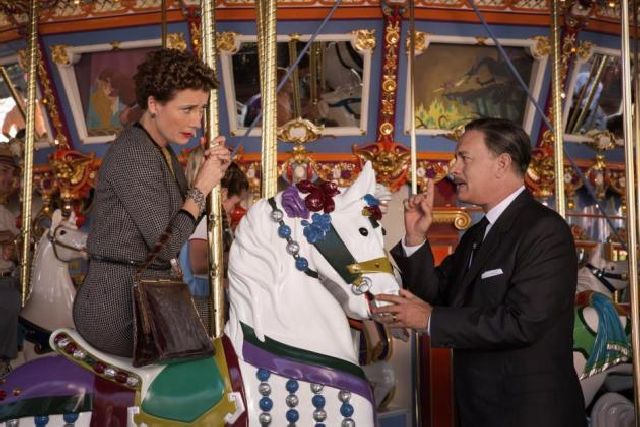Saving Mr Banks (2013) 
“To bring Mary Poppins to life, he needs to work his magic.”

Director: John Lee Hancock
Cast: Emma Thompson, Tom Hanks, Annie Rose Buckley
Synopsis: Author P.L. Travers reflects on her childhood after reluctantly meeting with Walt Disney, who seeks to adapt her Mary Poppins books for the big screen.
Saving Mr Banks isn’t so much about how Walt Disney’s 1964 movie Mary Poppins came to be made as it is an exploration of the traumatic events that turned a carefree little girl into a prickly, misanthropic semi-reclusive adult. In order to tell this story, it’s necessary for director John Lee Hancock (The Alamo, The Blind Side) to tell two tales – one which takes place in the sun-dappled environs of early-1960s Los Angeles, the other in Australia during the early years of the 20th Century. The contrast between the young girl – who, despite her parents’ obvious shortage of funds, enjoys an idyllic, bohemian lifestyle – and the sharp-tongued, middle-aged spinster is a startling one that invites the audience to question exactly what happened in her past to change her so. The story alternates between the two timelines, sometimes merging them to accentuate the influence the past has on the present, and showing us the emotional upheavals experienced by both the woman and the girl.
Emma Thompson (Carrington, Judas Kiss) plays Pamela Travers, the authoress of the popular Mary Poppins novels, the rights to which American movie producer Walt Disney (Tom Hanks – The Green Mile, Captain Phillips) has been trying to buy from her for two decades. Until now, Mrs Travers had always refused him because of her loathing for Disney’s sentimental movies, but financial difficulties mean that she’s forced to at least consider Disney’s offer, and she reluctantly travels to California at Disney’s expense to examine the screenplay his studio has prepared. However, Mrs Travers has some strict conditions on which she refuses to negotiate – there are to be no songs and no animation. History tells us, of course, that the finished product contained both, and this part of the story shows how, through the sheer quality of the material and the avuncular charm of Walt Disney, Mrs Travers eventually capitulates.
The Mary Poppins stories contain some strong autobiographical elements, and the close attention Mrs Travers pays to the proposed movie’s script prompts a flood of often painful memories of her childhood. Her father, Travers (Colin Farrell), was a charming Irish rogue who loved his family deeply, but who was suffocated by the provincial lifestyle forced upon him by the need to support a young family, and so turned to booze to soften his unhappiness. The quelling of her father’s exuberant spirit as his health deteriorates has a marked effect on ‘Ginty’, as Mrs Travers’ father used to call her, which will colour her attitude towards life and money as an adult.
Emma Thompson looks a lot like an older Julie Andrews in Saving Mr. Banks, but this demure exterior is at odds with her prickly countenance, and it seems at first as if cuddly Uncle Walt will be no match for her bullish rectitude. In fact it seems strangely incongruous to see a picture in which a comparatively reserved American must handle an outspoken and often irrational Brit. Nevertheless, Disney is a patient man (although Hanks does a good job of providing small visual clues to the frustration he hides so well), and gradually finds the chinks in Mrs’ Travers armour. And let’s face it – he really does have to be a patient man. Most people, faced with the rigid inflexibility of an embittered woman like Mrs Travers would be prepared to do anything to avoid working with her. But then that leads us to the revelation that the film is also about the important role a parent plays in fashioning the adult their children become. And that statement doesn’t refer just to flesh and blood offspring, but to the fictional nanny and the cartoon mouse. Disney shares with Mrs. Travers this fierce protectiveness towards the creature he created, and although he doesn’t know of her fraught childhood relationship with her father, we understand that she doesn’t want to let her literary offspring down in the way that she ultimately realises her father failed her.
Saving Mr. Banks gives both Thompson and Hanks the opportunity to get their teeth into some juicy roles – even though they are completely opposite characters – and neither actor lets the opportunity defeat them. While Thompson relishes the showier role, it’s Hanks who gets the big, movie-defining speech which can be seen not only as a summary of Saving Mr. Banks’ message, but as perhaps a subtle acknowledgement and plea to the audience for forgiveness for the way in which the movie plays with the truth. “We restore order with imagination,” he says, as he talks to Mrs. Travers but faces the audience, “We instil hope again and again and again.” It’s an uplifting message – and one that holds true when a movie is as well-made and acted as Saving Mr. Banks.
httpv://www.youtube.com/watch?v=a5kYmrjongg
